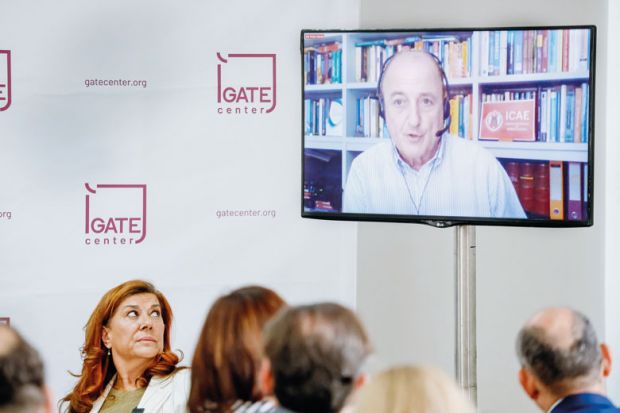Academic conferences that allowed presenters to speak from wherever they wished were once touted as the future for post-Covid events, with many scholars embracing the opportunity to address auditoriums from their offices, bedrooms and even cars.
But the future of fully hybrid conferences is looking less certain after several major academic events banned speakers from presenting remotely and scaled back online streaming of keynote addresses and panel discussions.
The moves follow concerns that the travel-free option for speakers is leading to empty podiums and an “us and them” culture between remote panellists and assembled delegates. Some organisers have also flagged the logistical complexity of enabling online speakers and the vastly inflated cost of running hybrid events, which often require numerous video and audio production staff, producers and technical support.
The European Society of Cardiology, which typically welcomes about 30,000 delegates to its annual congress, said that “all presenters will be onsite” for its event in Barcelona in August and that “only participants can be fully remote”.
The Society for Neuroscience, whose annual meeting also attracts some 30,000 participants, said its conference in San Diego in November would be “in-person” and it would offer only a “sampling of annual meeting content virtually”.
Mary Beth Barilla, programme director for the Society for Scholarly Publishing, whose annual gathering took place in Chicago in June, said the organisation had “asked that all speakers appear in person”, although virtual delegates were able to connect via the meeting’s app.
While the approach was taken primarily to “avoid some of the technological challenges that can arise with hybrid panels, there was also a reluctance to ask on-site attendees to travel to the event just to watch a group of speakers on video”, Ms Barilla said.
“In the end, we made some exceptions, and not surprisingly, some speakers had to cancel at the last minute, for various reasons,” she added.
The society’s approach to hybrid conferences was likely to “evolve over time as we gain more experience”, said Ms Barilla. “Of course,” she continued, “hybrid is definitely more expensive and requires additional staff resources – the challenge is balancing the additional cost with the benefits of offering a virtual option to satisfy member demand and advance our diversity, equality, inclusion and accessibility goals.”
Mark Carden, who organised the 2022 Researcher to Reader Conference on scholarly publishing in London in February, said he was reviewing whether to offer the online option to all speakers for next year’s event after 80 per cent of panellists and moderators spoke remotely this year.
While some speakers cited pandemic-related travel bans, budget constraints, timing issues and positive Covid tests, some based in London chose that option for “convenience”, he said.
“Other events have never had the culture of ‘you are the audience – we are the speakers’, but we risk going there when you have a physical conference in which most of the panellists stay at home,” said Mr Carden, who added that online speakers usually left little time to respond to questions from the floor and seldom stayed to listen to other talks. “At least half of a panel should be in-person in future,” he suggested.
Conference organisers might need to consider whether online-only or in-person-only would better suit their audiences, continued Mr Carden, who said he remained committed to the hybrid model because it allowed many more people to engage with events.
POSTSCRIPT:
Print headline: Conferences don’t see a hybrid future
Register to continue
Why register?
- Registration is free and only takes a moment
- Once registered, you can read 3 articles a month
- Sign up for our newsletter
Subscribe
Or subscribe for unlimited access to:
- Unlimited access to news, views, insights & reviews
- Digital editions
- Digital access to THE’s university and college rankings analysis
Already registered or a current subscriber? Login








